Items
Mediator is exactly
Essential Workers
-
2020-04
The Unseen Heroes: A Tribute to Essential Workers
In the turbulent maelstrom of the COVID-19 pandemic, a silent but terrifying force has emerged: the workforce needed They were the unsung heroes of our time, navigating the treacherous waters of the mind uncertainty and fear to keep the public afloat. When I think about the impact of COVID-19, I am drawn to their stories, their sacrifices and their resilience. Each day as I scoured the news, filled with alarming statistics and heartbreaking stories, I couldn’t help but marvel at the dedication of these individuals. And from the health care workers fighting on the front lines, to the store clerks making sure things stay on the shelves, to the delivery drivers braving the delivery of vital supplies to our doors and them courage and selflessness are beacons of hope in the darkest of times. I remember a particularly poignant moment when I saw a picture of a nurse in protective gear holding the hand of an elderly patient. The painting spoke volumes about compassion and human connection in the face of loneliness. And it captures the essence of the epidemic: struggle, solidarity and the unwavering spirit of humanity. But amidst the chaos, there were also moments of beauty and resilience. I stumbled upon a series of Instagram posts featuring acts of kindness - neighbors helping each other, community members rallying to support local businesses, and strangers offering words of encouragement through virtual forums. This gesture was small, but powerful in its impact and served as a reminder that humanity triumphs even in the darkest of times Sharing these stories and ideas reminds us of the importance of documenting our collective experiences during this period of history The pandemic dramatically changed our world, leaving an indelible mark on our collective consciousness . . . . By preserving this information, we ensure that future generations understand not only the challenges we faced but also the strength and compassion that emerged in response. -
2020-12-20
Declaring Patient 100 Deceased Life as a NYC EMT During an Unprecedented Global Pandemic
December 20th, 2020, started as an “ordinary” day for myself and my colleagues. 1600 hours rolled around, and my partner and I clocked in for our sixteen-hour tour. We had finally adjusted to our new routine of working a mandatory sixteen hours as opposed to twelve. As emergency medical technicians, we were at the forefront of the COVID-19 Pandemic in New York City. Our region was hit hard by COVID-19 and seemed to be the epicenter of the pandemic for longer than one could ever imagine. For NYC EMS workers before the pandemic, it was common to see around three thousand calls for service daily across all five boroughs. Once the pandemic struck the call volume rapidly overwhelmed the city's EMS resources as they answered a record seven thousand calls for service daily. My partner and I made small talk as we awaited the arrival of the outgoing crew. The day shift arrived back at the station exhausted, defeated, and depressed. They informed us that during their sixteen-hour tour, they had answered twenty calls for service; fifteen of which were for critically ill patients. After some small talk, we exchanged medication kits and radios as it was our turn to serve the great city. Immediately after logging on to the computer system and giving the dispatch center an in-service signal, we were called for a priority one assignment. Our unit was called to the scene of a thirty-two-year-old mother diagnosed with COVID-19 who had stopped breathing. As we arrived at the scene, I donned my four-day-old n95 mask, as well as a makeshift gown made from a garbage bag with holes cut for my head and arms. As we made our way up the five flights of stairs the sound of the screams grew louder. We entered the apartment to find a woman lying on the couch who was clinically deceased. For the next forty-five minutes, my partner and I worked feverishly to perform cardiopulmonary resuscitation, defibrillation, endotracheal intubation, as well as intravenous cardiac drug administration. Despite our efforts, the patient continued to show no signs of life, my partner and I locked eyes and nodded at one another, knowing we had done all that we possibly could have for this patient. I switched the cardiac monitor off and looked down at my watch as I said, “Time of death 1705 hours”. Our next responsibility was to inform the patient’s husband and children of her passing. While you train for many hours to show empathy after death, this task never gets easier. My partner sat in the kitchen with the family, while I prepared the paperwork for a death pronouncement. My partner delivered the life-shattering news and did her best to console a grieving family. After returning to our ambulance to decontaminate our equipment and restock for the next assignment I opened my logbook to record the death encounter. My heart sank as I turned to the next open page which was page number one hundred. In less than one year, I had pronounced one hundred patients deceased from COVID-related illnesses. In my short career before the pandemic, I had only pronounced about fifteen patients deceased. It was at that moment that the true magnitude of the pandemic sank in. COVID-19 had decimated the way of New York City life, the previously bustling city remained shuttered as many remained in indoors in hopes of preventing illness. Before the pandemic, I had known the city as a connection of vibrant neighborhoods filled with culture and joy. COVID-19 had robbed our great city of its life and color; for the next two years, the city appeared black and white as a shell of its previous greatness. These thoughts quickly fled my mind as my unit was once again called to another high-priority assignment. We were called to a sixteen-year-old man diagnosed with asthma, who had recently contracted COVID-19 and was struggling to breathe. Our days were filled with assignments like these, often with no rest, and zero opportunities for a meal break. Nearly one year into the COVID-19 pandemic, my colleagues and I were exhausted, and our mental health and morale were at an all-time low. Many of my collogues fell ill, and four of them died because of COVID-19. We had often asked ourselves and one another; “Why Us? Why are we still doing this job? and when will this end?” While these times were challenging, we understood that we had been called to work in EMS because of our passion for caring for those in need. Day in and day out, we found strength and resilience in one another. My colleagues and I had implemented daily peer support groups in which all were welcome to come and speak about their experiences. While COVID-19 seemed to pull the world apart, it pulled EMS staff closer together. Enemies quickly became friends, and seemingly overnight we all became family. Our perspectives were unique as we were the only healthcare providers to enter the homes of the ill, and feverishly worked to care for them under less-than-ideal conditions. As the number of COVID-19 cases began to decline with the introduction of the vaccine, my colleagues and I felt we could breathe a sigh of relief. As quickly as the pandemic entered our great city, it seemed to vanish even faster. Each shift brought hope as we watched businesses reopen, and the streets were once again filled with color and culture. While we experienced new variants and spikes in COVID-19 cases, we felt that our great city had become stronger and more resilient. While COVID has changed our way of life, one thing I will never forget is the comradery we built amongst the emergency medical services personnel. To this day my colleagues remain a second family in which I can confide after a difficult shift. While COVID was one of the greatest challenges faced by New York City, I feel that it has made us stronger and more resilient than ever. -
2021-03-18
A Burial Post Pandemic
I did not travel during the entirety of the strict lockdown period of the COVID-19 Pandemic. My wife and I worked in retail and were deemed essential so we worked through it from April 2020 until the restrictions were broadly lifted. In March 2021 my mother died of an unrelated illness, the first trip I took after the travel restrictions were lifted was to bury her in Carlsbad, New Mexico. We did not hold a funeral service and we did not hold a memorial, she was cremated and buried quietly. I remember this very vividly because even at that time it felt wrong to travel and to be interacting with people in a way that wasn't required by work. We wore masks the entire time. Due to our proximity to El Paso, TX I remember vividly when they were storing bodies in buses in the streets there and this made us fearful and cautious. Even had we not been still in the throes of the pandemic, I don't think I would have done anything differently but I do believe that the added stress of travel would not have been present thus making the trip more manageable. Due to our need to isolate, and resist getting sick, what I remember most of all is the loneliness of the matter, and the quiet car rides, and wondering 'How might things have been different?' -
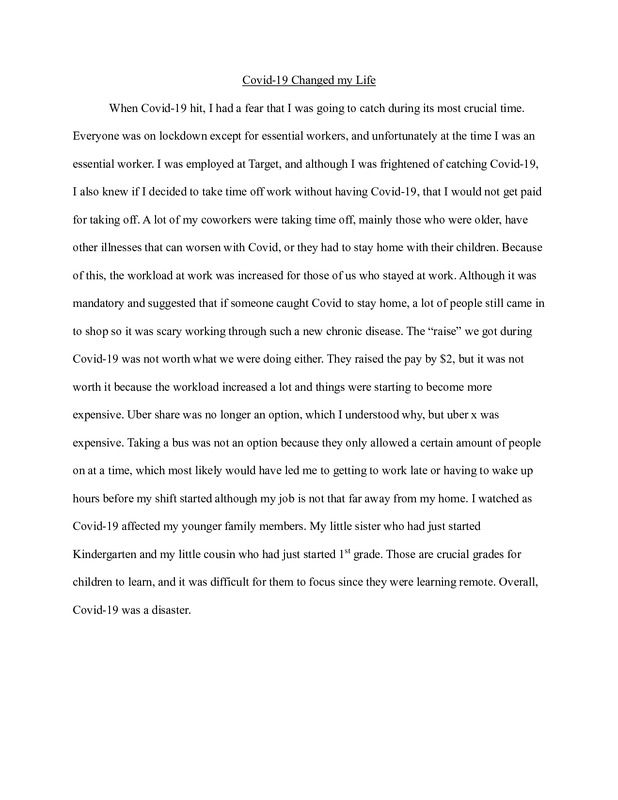 2019-09
2019-09Covid-19 Changed my Life
The item that I am a submitting is a short summary of my experience during Covid-19 -
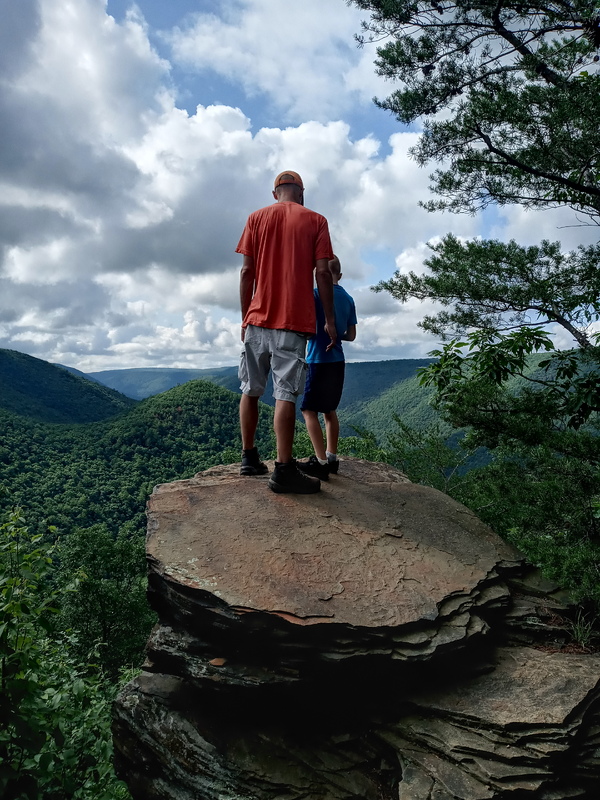 2021-05-15
2021-05-15A Measure of Peace During a Global Pandemic
During the COVID-19 pandemic I was working in health care for an agency. This meant that I traveled from facility to facility where there were staffing shortages and predominantly worked in the covid units. It was a strange experience to travel across Pennsylvania during this time and have little to no traffic that would typically have existed were there not any restrictions enacted. Therefore, when the restrictions were lifted, I did not feel an urge to travel to any great extent as I never stopped working during the lockdowns and if anything, my hours were significantly increased to the point of constant exhaustion. However, when the restrictions were lifted, I found myself in need of outdoor therapy. I am an avid hiker and enjoy the silence that trails offer. I have found that my favorite trail to visit is the Golden Eagle Trail, or as my children refer to it “Rattlesnake Ridge.” While the restrictions were lifting in most places at the time, I hardly noticed because in health care they remained for a much longer period. On many occasions in 2021, my family accompanied me to the Golden Eagle Trail to step away from society and unwind as a family without feeling the pressure of all the changes that were brought about by the pandemic. These trips provided me with lasting memories of my son reaching for my hand for security when walking along a thin train with a steep drop alongside it, my husband helping steady me across slippery rocks, and more. The photos from these trips are everlasting reminders of the happiness that hiking, especially with my family, bring me. Moments like these are to me the important moments in life. -
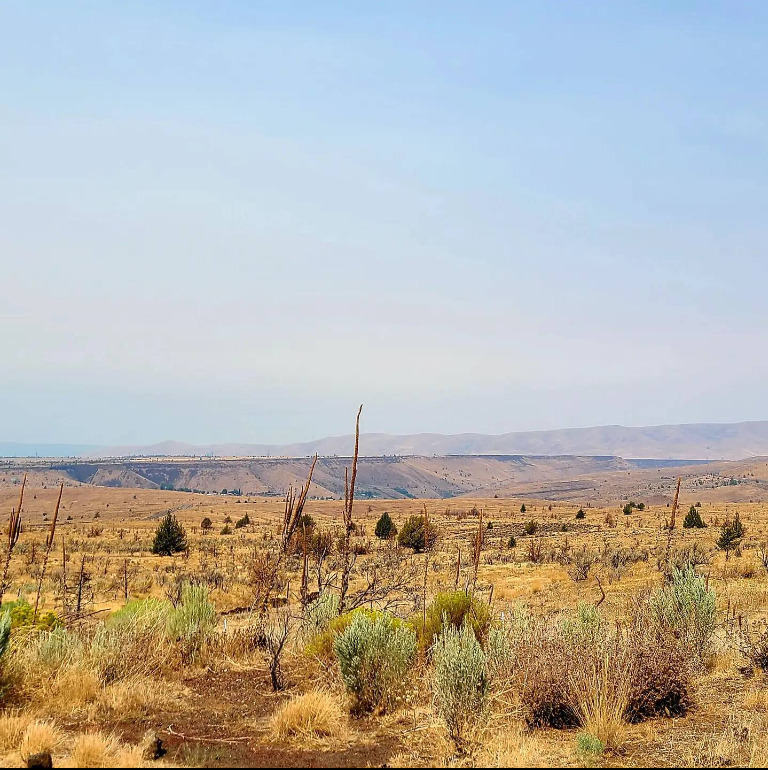 2021-08-15
2021-08-15Pandemics, Wildfires, and Climate Change
The Covid 19 Pandemic is and was a transformative event representing history in the making. The state of Oregon and particularly Portland witnessed a trifecta of converging crises beginning with the lockdown on St. Patrick’s Day in 2020. That summer was one of the hottest in recorded history and saw the city and state divided in smoke-filled chaos. The literal last words of “I can’t breathe” uttered by George Floyd were being chanted in the streets downtown as wildfires raged in all corners of the state, set against the backdrop of a global pandemic. Everything felt surreal and the tension in the city was like a powder keg. By the following summer some advancements had been made, the first round of vaccinations administered, but the same underlying issues were present in Portland. Houselessness, fractured political ideologies, and Far-Right and Far-Left members clashing in an invisible maelstrom on the Willamette River. My husband and I had adhered to the very stringent guidelines and protocol set by both the city and state to the letter. For a bit of context, my husband worked on the front line as a department manager at a grocery store and wore a mask for eleven hours at a time often six days a week for a year and a half, while I volunteered at the Red Cross and held down the home front. In August of 2021, we finally decided that we needed to get out of town, so we grabbed the dog and set a course for the Crooked River in Central Oregon. It was a two-week period of sheer peace and glory bookended by fear and anger at the negligence of fellow humans. We camped on the river and practiced mindfulness and being present every day, breathing deeply the fresh air ushered in by a strong breeze from the East. The “going there” and “going home” portions were marred by anti-mask protestors with weapons arguing about state’s rights, as death toll numbers were rising. The fires had already burned over a million acres with no signs of slowing down, and the reality of Portland’s social justice issues did not disappear just because we did. The experience left us feeling gratitude for the opportunity to explore, our good health, and open minds, it was our 18th wedding anniversary, in which porcelain is traditionally given as a gift. Ironic, given the fact that not only is porcelain extraordinarily beautiful but also incredibly delicate, a perfect representation of the state of things during the summer of 2021. -
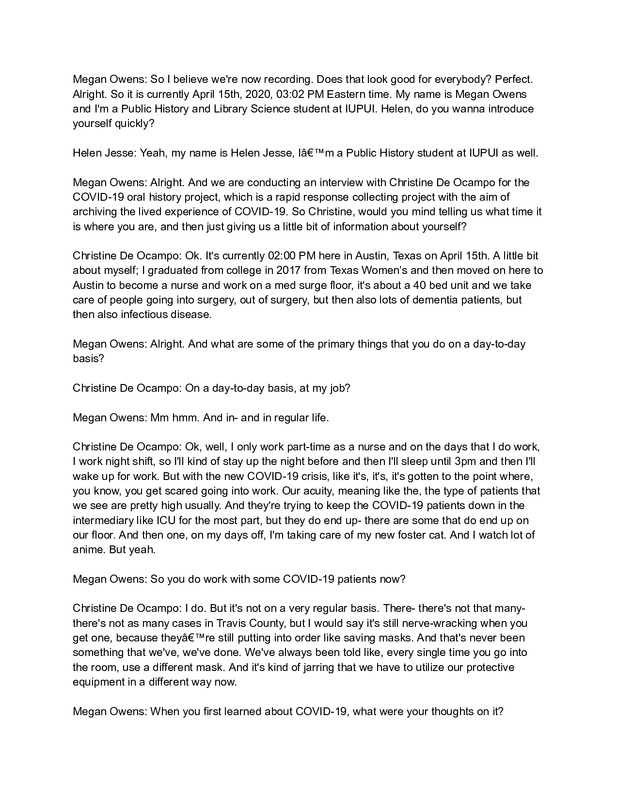 04/15/2020
04/15/2020Christine De Ocampo Oral History, 2020/04/15
-
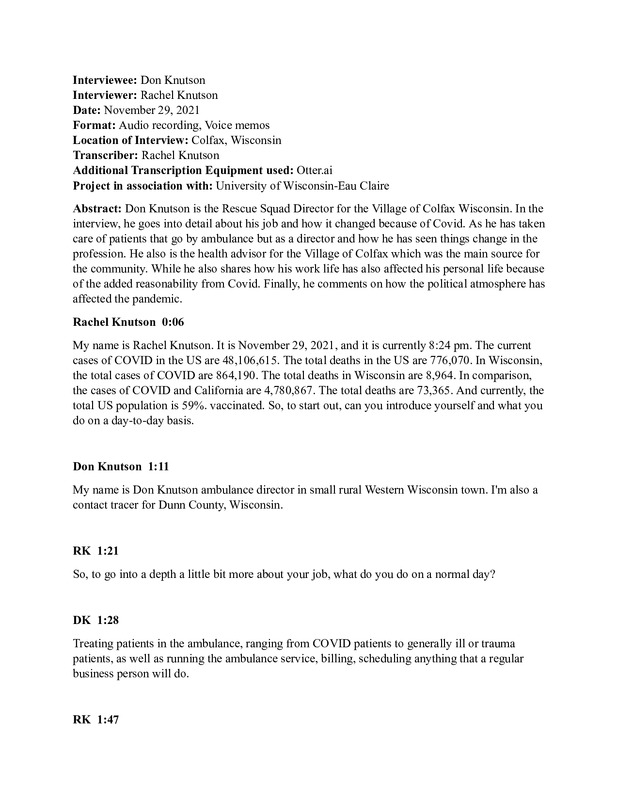 11/29/2021
11/29/2021Don Knutson Oral HIstory, 11/29/2021
Don Knutson is the Rescue Squad Director for the Village of Colfax Wisconsin. In the interview, he goes into detail about his job and how it changed because of Covid. As he has taken care of patients that go by ambulance but as a director and how he has seen things change in the profession. He also is the health advisor for the Village of Colfax which was the main source for the community. While he also shares how his work life has also affected his personal life because of the added reasonability from Covid. Finally, he comments on how the political atmosphere has affected the pandemic. -
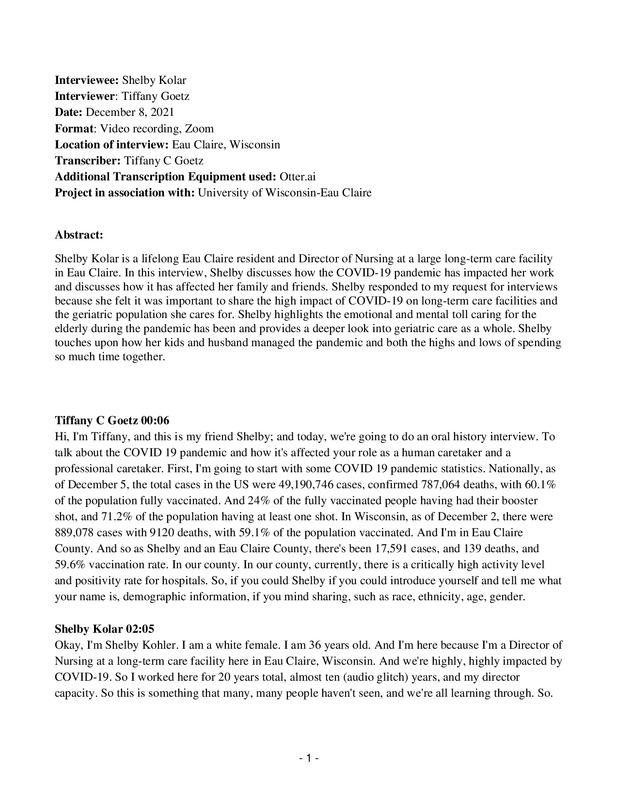 12/08/2021
12/08/2021Shelby Kolar Oral History, 2021/12/08
Shelby Kolar is a lifelong Eau Claire resident and Director of Nursing at a large long-term care facility in Eau Claire. In this interview, Shelby discusses how the COVID-19 pandemic has impacted her work and discusses how it has affected her family and friends. Shelby responded to my interview request because she felt it was important to share the high impact of COVID-19 on long-term care facilities and the geriatric population she cares for. Shelby highlights the emotional and mental toll of caring for the elderly during the pandemic and provides a deeper look into senior care as a whole. Shelby touches upon how her kids and husband managed the pandemic and the highs and lows of spending so much time together. -
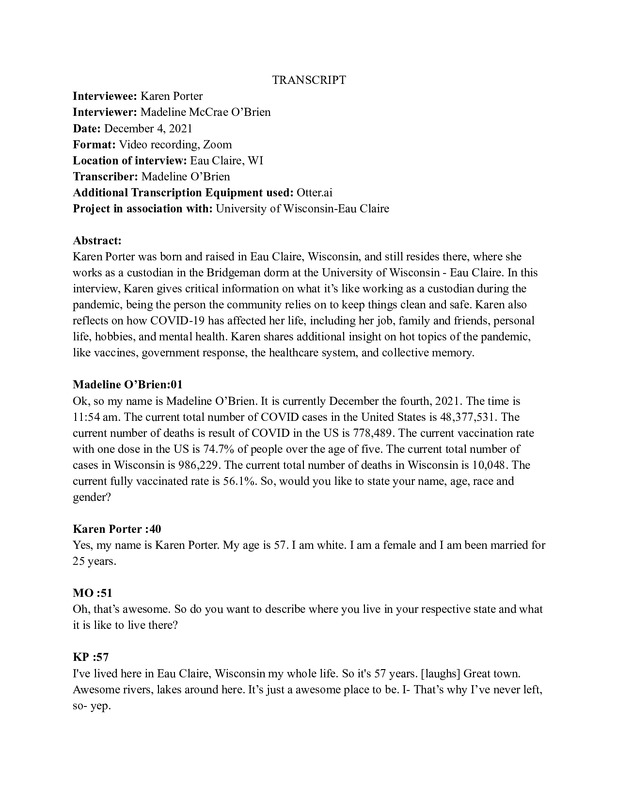 12/04/2021
12/04/2021Karen Porter Oral History, 2021/12/04
Karen Porter was born and raised in Eau Claire, Wisconsin, and still resides there, where she works as a custodian in the Bridgeman dorm at the University of Wisconsin - Eau Claire. In this interview, Karen gives critical information on what it’s like working as a custodian during the pandemic, being the person the community relies on to keep things clean and safe. Karen also reflects on how COVID-19 has affected her life, including her job, family and friends, personal life, hobbies, and mental health. Karen shares additional insight on hot topics of the pandemic, like vaccines, government response, the healthcare system, and collective memory. -
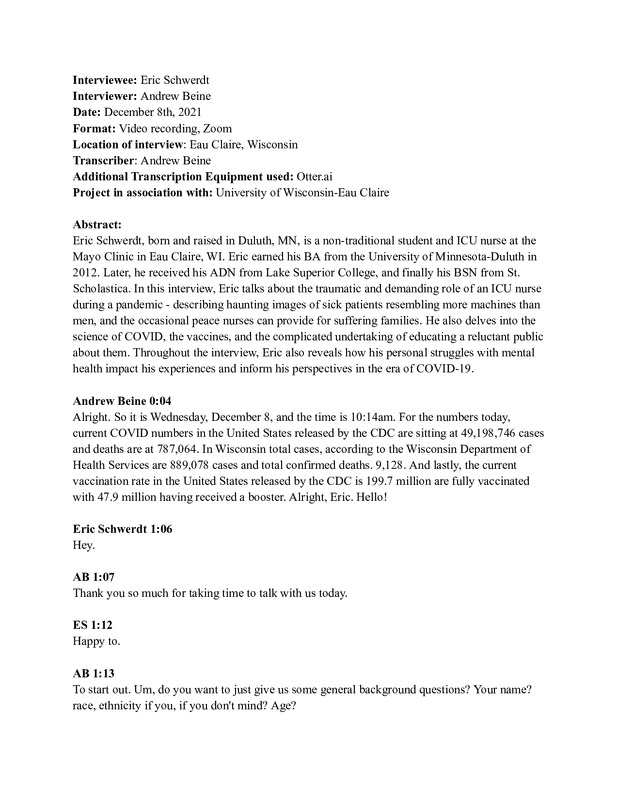 12/08/2021
12/08/2021Eric Schwerdt Oral History, 2021/12/08
Eric Schwerdt, born and raised in Duluth, MN, is a non-traditional student and ICU nurse at the Mayo Clinic in Eau Claire, WI. Eric earned his BA from the University of Minnesota-Duluth in 2012. Later, he received his ADN from Lake Superior College, and finally his BSN from St. Scholastica. In this interview, Eric talks about the traumatic and demanding role of an ICU nurse during a pandemic - describing haunting images of sick patients resembling more machines than men, and the occasional peace nurses can provide for suffering families. He also delves into the science of COVID, the vaccines, and the complicated undertaking of educating a reluctant public about them. Throughout the interview, Eric also reveals how his personal struggles with mental health impact his experiences and inform his perspectives in the era of COVID-19. -
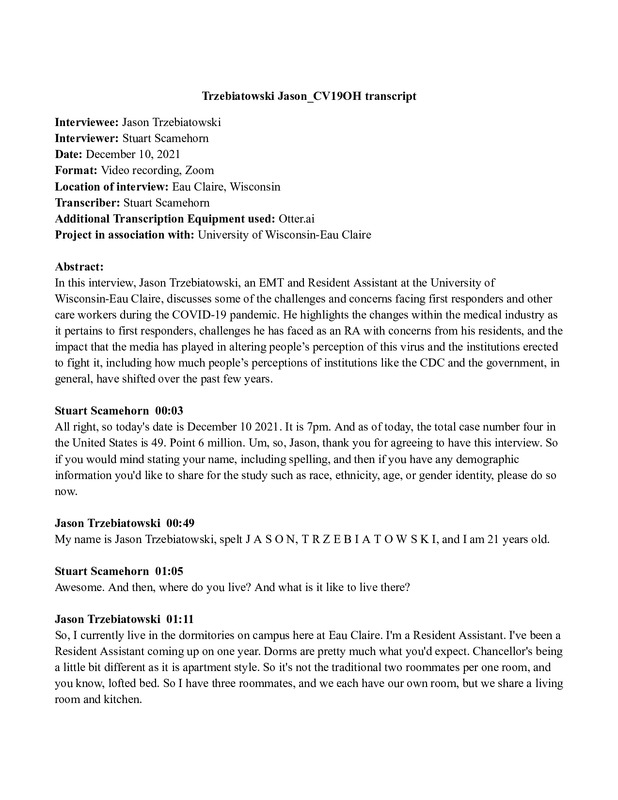 12/10/2021
12/10/2021Jason Trzebiatowski Oral History, 2021/12/10
In this interview, Jason Trzebiatowski, an EMT and Resident Assistant at the University of Wisconsin-Eau Claire, discusses some of the challenges and concerns facing first responders and other care workers during the COVID-19 pandemic. He highlights the changes within the medical industry as it pertains to first responders, challenges he has faced as an RA with concerns from his residents, and the impact that the media has played in altering people’s perception of this virus and the institutions erected to fight it, including how much people’s perceptions of institutions like the CDC and the government, in general, have shifted over the past few years. -
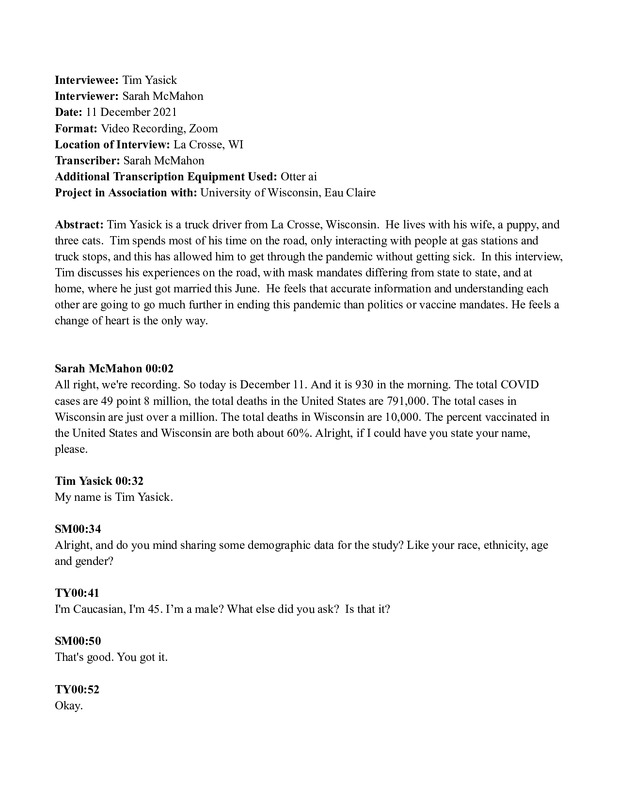 12/11/2021
12/11/2021Tim Yasick Oral History, 2021/12/11
Tim Yasick is a truck driver from La Crosse, Wisconsin. He lives with his wife, a puppy, and three cats. Tim spends most of his time on the road, only interacting with people at gas stations and truck stops, and this has allowed him to get through the pandemic without getting sick. In this interview, Tim discusses his experiences on the road, with mask mandates differing from state to state, and at home, where he just got married this June. He feels that accurate information and understanding each other are going to go much further in ending this pandemic than politics or vaccine mandates. He feels a change of heart is the only way. -
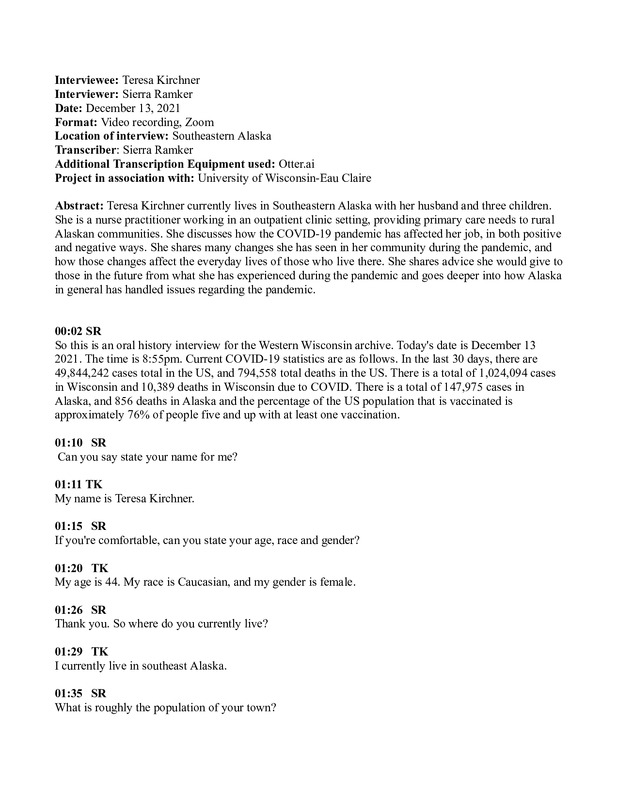 12/13/2021
12/13/2021Teresa Kirchner Oral History, 2021/12/13
Teresa Kirchner currently lives in Southeastern Alaska with her husband and three children. She is a nurse practitioner working in an outpatient clinic setting, providing primary care needs to rural Alaskan communities. She discusses how the COVID-19 pandemic has affected her job, in both positive and negative ways. She shares many changes she has seen in her community during the pandemic, and how those changes affect the everyday lives of those who live there. She shares advice she would give to those in the future from what she has experienced during the pandemic and goes deeper into how Alaska in general has handled issues regarding the pandemic. -
 11/27/2021
11/27/2021Rebecca Ferber Oral HIstory, 2021/11/27
Rebecca Lynn Ferber is a resident of Oronoco, MN, and currently works for the Mayo Clinic in Rochester as a CRNA (Certified Registered Nurse Anesthetist). In this interview, Rebecca talks about how COVID has affected her job as a CRNA and Mayo Clinic as a whole as well as a mom and wife. She also talks about how it has affected her family and friends and how some of her relationships have been strained because of different views on COVID. She touches on how it not only affects people's physical health but mental health as well and gives some advice for future generations. -
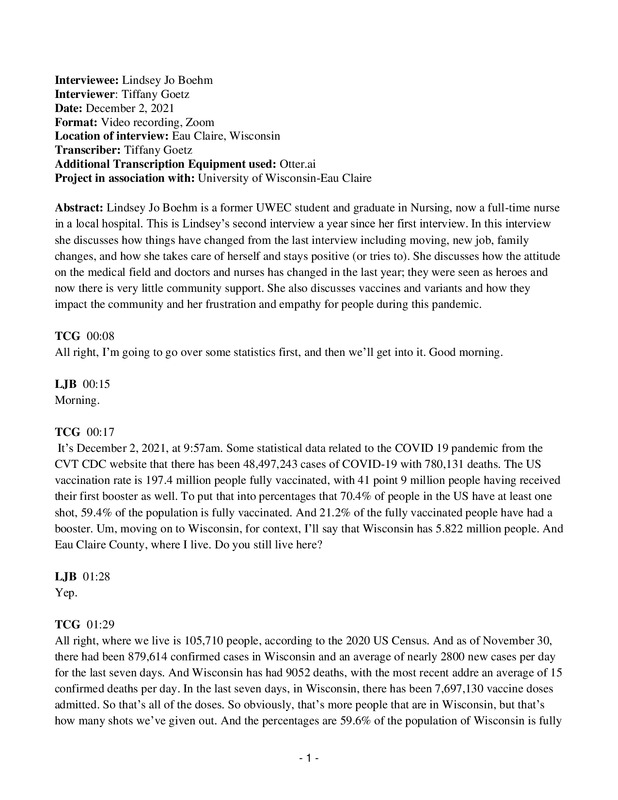 12/02/2021
12/02/2021Lindsey Jo Boehm Oral History, 2021/12/02
Lindsey Jo Boehm is a former UWEC student and graduate in Nursing, now a full-time nurse in a local hospital. This is Lindsey’s second interview a year since her first interview. In this interview, she discusses how things have changed from the last interview including moving, a new job, family changes, and how she takes care of herself and stays positive (or tries to). She discusses how the attitude in the medical field and doctors and nurses has changed in the last year; they were seen as heroes and now there is very little community support. She also discusses vaccines and variants and how they impact the community and her frustration and empathy for people during this pandemic. -
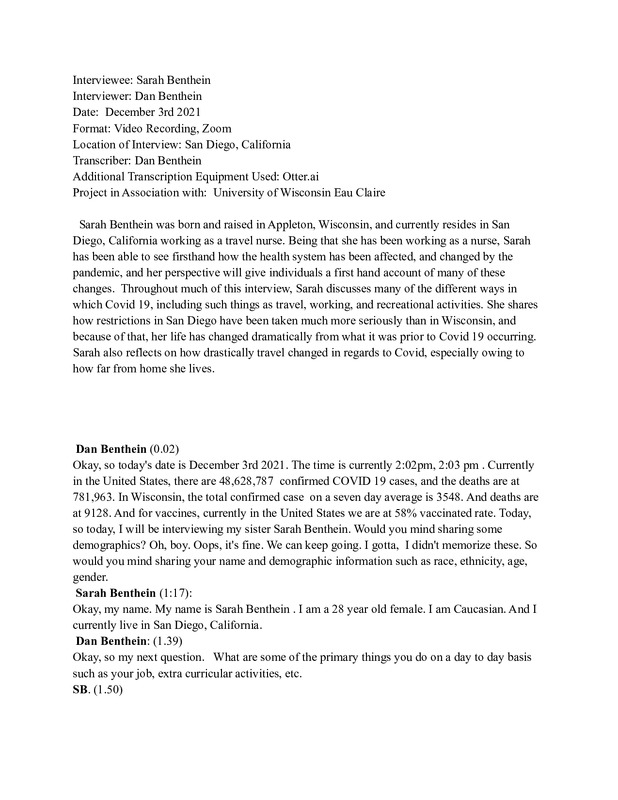 12/03/2021
12/03/2021Sarah Benthein Oral History, 2021/12/03
Sarah Benthein was born and raised in Appleton, Wisconsin, and currently resides in San Diego, California working as a travel nurse. Being that she has been working as a nurse, Sarah has been able to see firsthand how the health system has been affected, and changed by the pandemic, and her perspective will give individuals a first-hand account of many of these changes. Throughout much of this interview, Sarah discusses many of the different ways in which Covid 19, including such things as travel, working, and recreational activities. She shares how restrictions in San Diego have been taken much more seriously than in Wisconsin, and because of that, her life has changed dramatically from what it was prior to Covid 19 occurring. Sarah also reflects on how drastically travel changed in regards to Covid, especially owing to how far from home she lives. -
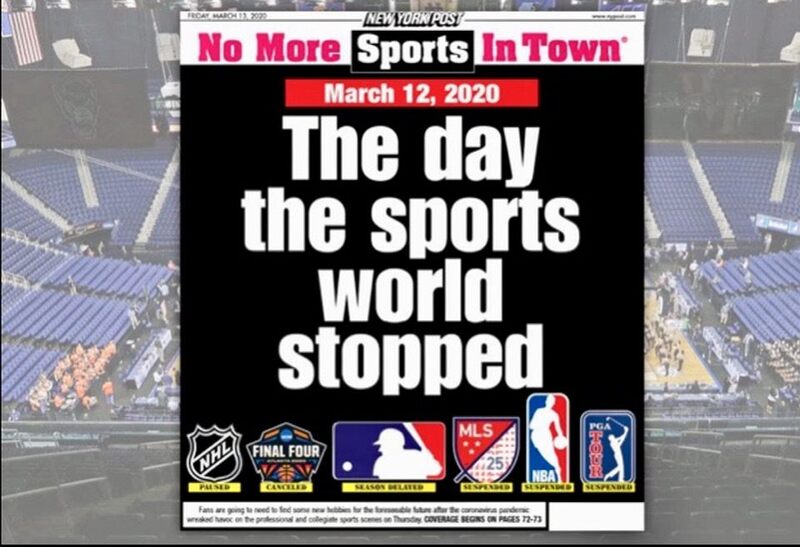 2023-03-25
2023-03-25Our story from Walbrooke Avenue
This is a chronicle of the pandemic from March through December 2020. It shows how normal things were abnormal and yet somehow the same. -
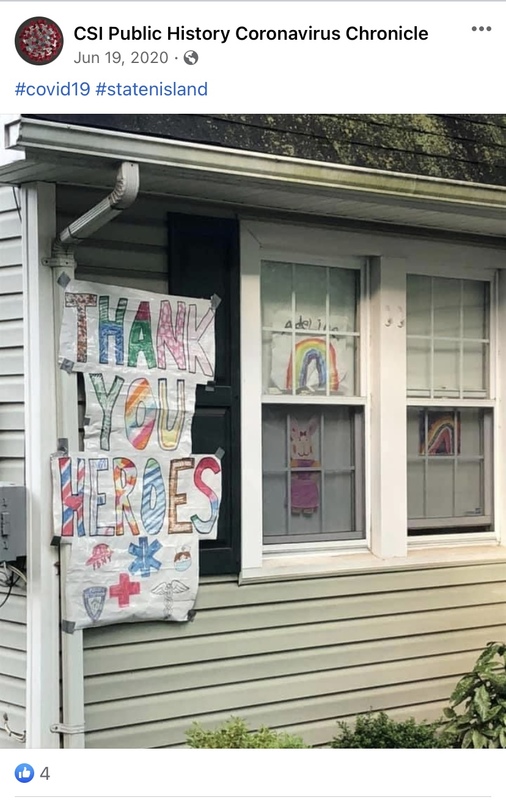 June 19, 2020
June 19, 2020Essential Worker Appreciation
Screenshot of a poster thanking Staten Island essential workers from the CSI Public History Coronavirus Chronicle Facebook page -
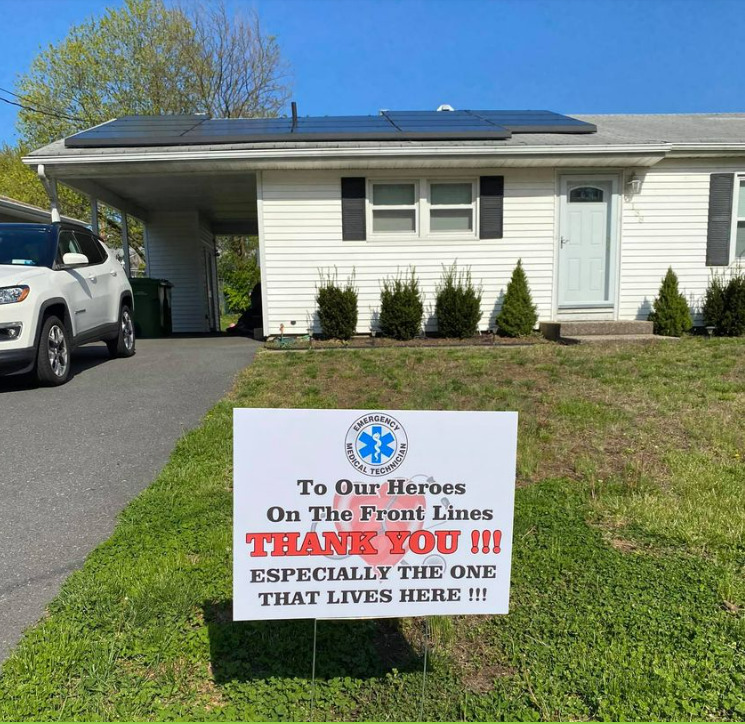 2020-12-22
2020-12-22It’s so nice to be recognized for our dedicated hard work.
It’s so nice to be recognized for our dedicated hard work. Found this on the front lawn. Our neighbor's rock ❤️ Thank you to Courtney Tobin for sharing Jennifer Jane's update. -
2020-03-06
The Two Week Break
My Junior year at Midwood High School took an expected turn as a national emergency was declared on March 13, 2020. I remember watching the news with my mother, excited to see I would have two weeks off from school. My mother and I would both be home as all non-essential businesses moved to remote or closed down indefinitely. I immediately messaged my friends about the two week break, planning to play video games all day long. We spent those two weeks staying up late as if it was an extended spring break. Little did I know that those two weeks would turn into months of isolation, living in fear of going into the outside world. I feared for my father as he was a registered nurse at Woodhull Hospital. Not only did he have to go outside everyday for work, but he would be face to face with patients, many sick and dying from this new virus that took the world by surprise. There was no vaccine for almost an entire year, so all he could rely on were masks, gloves, face shields and hair nets. My father and many other medical workers were needed overtime to deal with the immense amount of patients coming in everyday. As he came home from work my mother would bring his clothes and leave them by our front door. I worried for him at work as I feared he could get this virus that we were still learning about. Thankfully he never got sick with Covid-19 during the early pandemic, and with the new vaccines in development many of our fears were put to rest. After almost two months of not having any classes we were introduced to remote learning through zoom and google classroom. It was a very new experience for my fellow classmates and I, but it was nice not having to leave your bed to go to class for a while. However that relief of not waking up early to go to class turned into yearning to go to school and seeing my friends. Waking up every morning to see a screen filled with blank profile pictures with names made me feel very lonesome. I would never imagine missing going to school, but it was something that I had taken for granted. In my senior year of high school there was the option for hybrid learning which I was very excited about, but I'd later find out that there would only be rows of desks set up in my school gyms we used for physical education. It wouldn't be the everyday schedule of switching classes and seeing my friends in the hallways and library. I ended up doing another year of remote learning which was very draining but I managed to do well in all my classes with nothing else to do. Unfortunately I did not have a prom or senior trip, but I was very lucky to have an in person graduation and see all of the people I once saw everyday again. This story of the pandemic is very significant to me as it taught me to never take things for granted as everything can change in a moments notice. The things I'd known as my everyday routine of school and hanging out became a distant memory for a long time until numbers and fears of the virus fell. Being able to go to campus now and have a regular life again is something I will now cherish forever. It is still somewhat hard to socialize again after being isolated for so long, but I have made some friends along the way and I look forward to all the memories that await me in the future. -
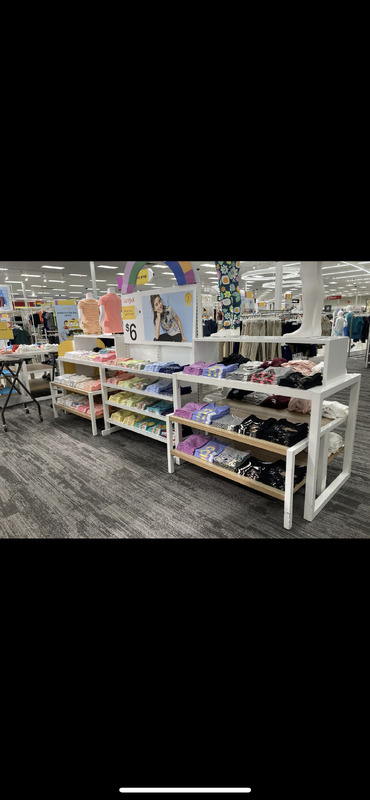 2020-07-01
2020-07-01Defender of Target
During COVID-19 I worked at Target. I was freshly 21 and like everyone else, was shocked by the intensity and severity of the pandemic. What had begun as a part-time gig quickly became my entire world. In the state I lived in, our store was considered an “essential business,” and therefore remained open. It was my job to stock and fold children’s clothes, maintaining a clean store front in the midst of the chaos. Throughout the early days, I would stand behind my folding table watching full-grown adults battle over toilet paper. They would line up outside of the store hours before it opened to ensure they’d receive a package of the holy grail. Suddenly, folding Peppa Pig shirts wasn’t my only duty. I became the protector of fitting rooms, the hunter of lost and contaminated clothing; gathering items that had been illegally tried on and stuffing them into their quarantine room, to “disinfect” for 3-5 business days. Being an essential employee during the pandemic made me jaded. It offered me insight into the human mind, a glimpse of what panic and fear can do to a person. I saw the worst, but also experienced kindness and empathy from people who understood what it was like to be caught in the midst of the hellfire. For some, Target turned into a safe haven, a place that remained open and reliable despite the madness going on in the world, while others gave up their sanity to keep it up and running. I will always think of my time at Target as a glitch in the matrix; a bizarre patch of time that tested the strength of a part-time sales associate, and humanity. -
2020-03
Gathering "Essentials"
March 2020. By now we have heard all the news about how COVID-19 is spreading and made it to the United States. The lockdowns were starting. I was working in a legal marijuana dispensary. A normal weekday at 2PM is our slow period, but this was different. We saw more customers than normal since most have been excused from work to start quarantining. By now most people have hoarded supplies such as food and toilet paper. But these customers were worried about being locked down without their weed. Customers were maxing out their legal limits they could buy. Shelves once full of edibles and vapes were running low. Nobody could have guessed that recreational marijuana would be considered essential, but to a lot of people it was. And that was the beginning of working through a pandemic. -
 2021-12-28
2021-12-28Pharmacy Technician Shortages
This NBC article goes into detail about the shortage of pharmacy technicians as a result of COVID-19. Drug shortages, staffing shortages, increased demand, and additional responsibilities with little to no training or compensation led to burnout. -
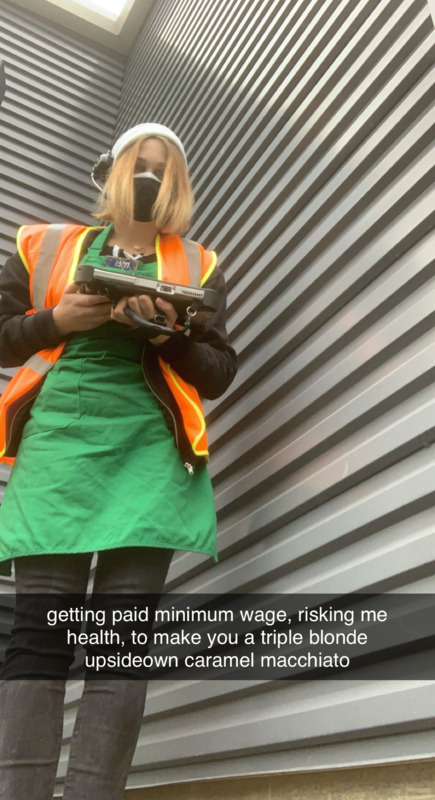 2020
2020Starbucks Barista in 2020
I worked at Starbucks Coffee Company from 2019-2021. The company begging their workers to continuously go to work under awful conditions, with little regard for their safety, took a huge mental toll, not only on me, but every barista. We were told providing coffee to our community was an "Essential" job, when in all reality is was essential for us to work to ensure that company's made a profit. We had to work to pay rent and buy food because the united states government offered little support, but were not justly compensated for our work. These pictures of myself remind me how tired I was working from 3 am to 2 pm, in the middle of a pandemic, in order to be able to afford living. -
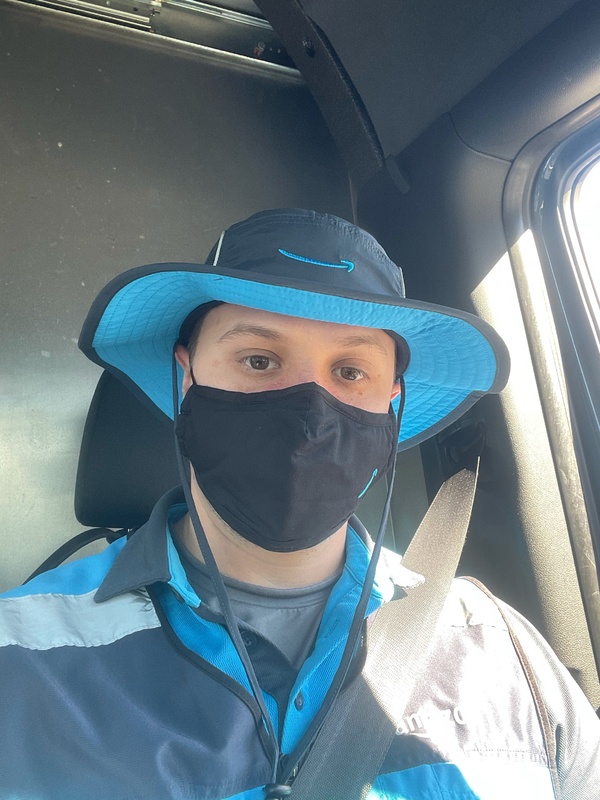 2020-08-16
2020-08-16Mask Breath and Swamp Mouth
In 2020 it was over 100 degrees Fahrenheit (38 + Celsius) in August in the eastern area of San Diego, California. I was working as a delivery driver for Amazon delivering packages around greater San Diego County. Having been about six months into the pandemic, masks were required pretty much everywhere. For health and safety, we were required to wear those masks while delivering. The picture above shows me wearing one of the masks which is made of cotton and double layered. These masks have a sleeve inside to insert a filter. Elastic strips with a stopper on the end goes around the ears to hold the mask over the nose and mouth. Because this mask irritated my ears, I took a bread wrapper twist and hooked it to the back and tied it so it wouldn't sit on my ears and was instead tied around the back of my head. This jerry rigged mask led to a tighter fit on my face. This in turn led to sweat and moisture collecting in the fabric of the mask throughout the day which led to an extremely pungent stench because of the sweat, mucus from a runny nose, and stinky breath. The other issue that caused more distress was the soaked mask. Especially on this particularly hot day, I was essentially breathing through a wet rag. Breathing through my mouth was the only option because my nose wasn't strong enough to draw in enough air. Climbing up stairs and up and down drive ways made it more difficult to breath. I had to take intermittent breaks to pull down the mask to get air and breath fresh air. Needless to say, mints, gum, and breath freshener was regularly on hand after this day. Along with lots and lots of water. -
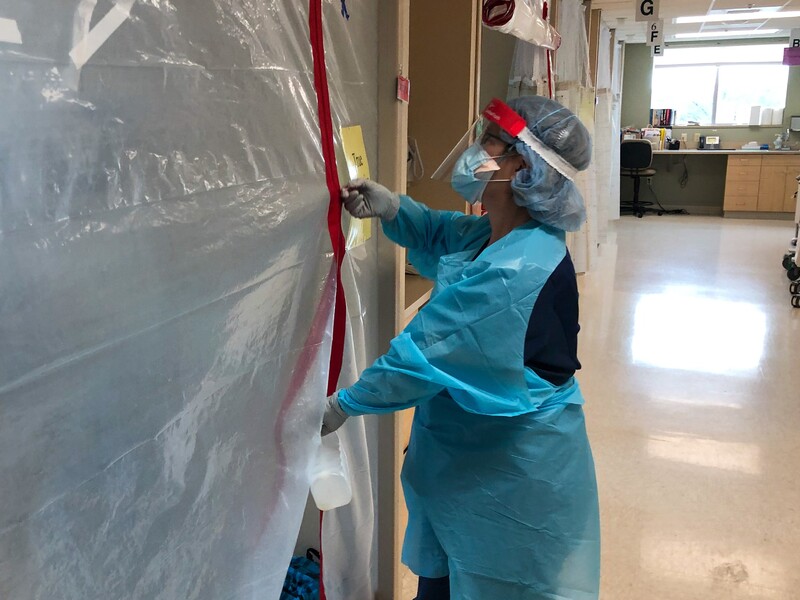 05/07/2021
05/07/2021Chris Delvin Oral History, 2021/05/07
Chris Delvin is the RN perioperative manager at the Marshfield Clinic in Eau Claire. In this interview, Chris discusses the effects of the pandemic on his clinic and how he and his staff responded by converting a surgical clinic into a negative flow covid unit and doubling the number of beds they could handle. He talks not only about work but also about how the pandemic has transformed his home and spiritual life. Matt Schneider also joins midway through and offers his perspectives on how Chris managed the situation and contributed to helping protect his community. -
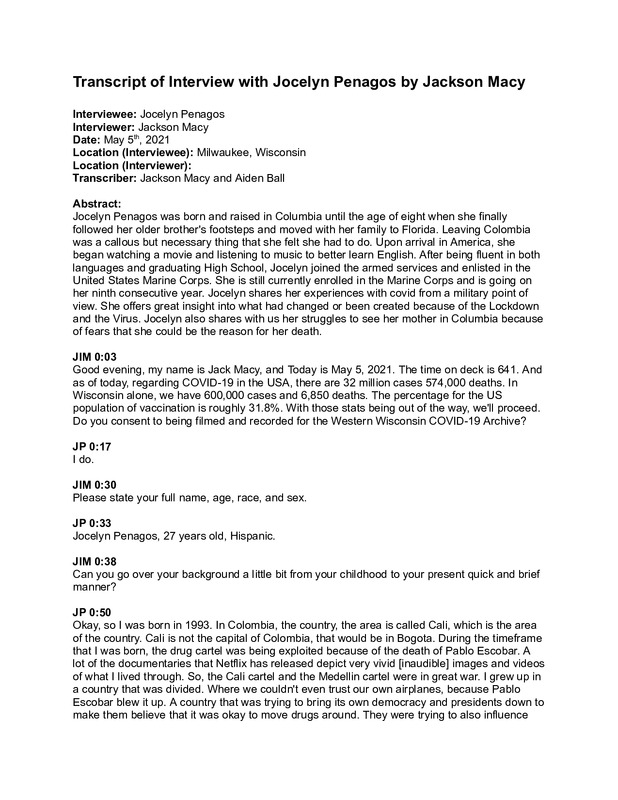 05/05/2021
05/05/2021Jocelyn Penagos Oral History, 2021/05/05
Jocelyn Penagos was born and raised in Columbia until the age of eight when she finally followed her older brother's footsteps and moved with her family to Florida. Leaving Colombia was a callous but necessary thing that she felt she had to do. Upon arrival in America, she began watching a movie and listening to music to better learn English. After being fluent in both languages and graduating High School, Jocelyn joined the armed services and enlisted in the United States Marine Corps. She is still currently enrolled in the Marine Corps and is going on her ninth consecutive year. Jocelyn shares her experiences with covid from a military point of view. She offers great insight into what had changed or been created because of the lockdown and the virus. Jocelyn also shares with us her struggles to see her mother in Columbia because of fears that she could be the reason for her death. -
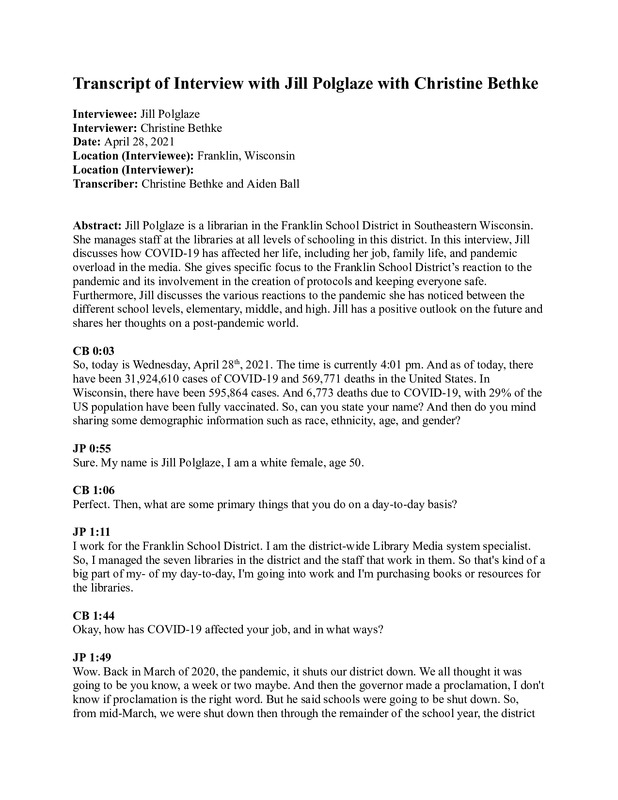 04/28/2021
04/28/2021Jill Polglaze Oral History, 2021/04/28
Jill Polglaze is a librarian in the Franklin School District in Southeastern Wisconsin. She manages staff at the libraries at all levels of schooling in this district. In this interview, Jill discusses how COVID-19 has affected her life, including her job, family life, and pandemic overload in the media. She gives specific focus to the Franklin School District’s reaction to the pandemic and its involvement in the creation of protocols and keeping everyone safe. Furthermore, Jill discusses the various reactions to the pandemic she has noticed between the different school levels, elementary, middle, and high. Jill has a positive outlook on the future and shares her thoughts on a post-pandemic world. -
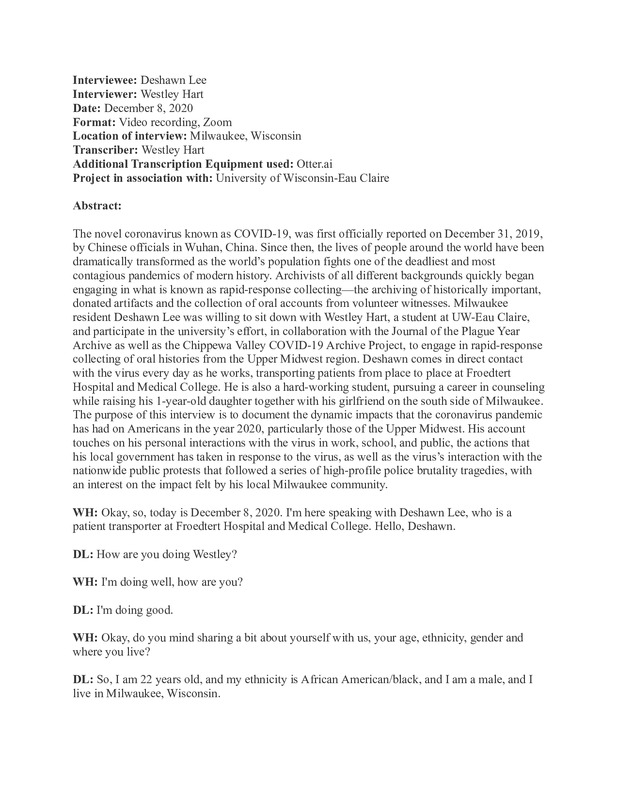 12/08/2020
12/08/2020Deshawn Lee Oral History, 2020/12/08
The novel coronavirus known as COVID-19, was first officially reported on December 31, 2019, by Chinese officials in Wuhan, China. Since then, the lives of people around the world have been dramatically transformed as the world’s population fights one of the deadliest and most contagious pandemics of modern history. Archivists of all different backgrounds quickly began engaging in what is known as rapid-response collecting—the archiving of historically important, donated artifacts and the collection of oral accounts from volunteer witnesses. Milwaukee resident Deshawn Lee was willing to sit down with Westley Hart, a student at UW-Eau Claire, and participate in the university’s effort, in collaboration with the Journal of the Plague Year Archive as well as the Chippewa Valley COVID-19 Archive Project, to engage in rapid-response collecting of oral histories from the Upper Midwest region. Deshawn comes in direct contact with the virus every day as he works, transporting patients from place to place at Froedtert Hospital and Medical College. He is also a hard-working student, pursuing a career in counseling while raising his 1-year-old daughter together with his girlfriend on the south side of Milwaukee. The purpose of this interview is to document the dynamic impacts that the coronavirus pandemic has had on Americans in the year 2020, particularly those of the Upper Midwest. His account touches on his personal interactions with the virus in work, school, and public, the actions that his local government has taken in response to the virus, as well as the virus’s interaction with the nationwide public protests that followed a series of high-profile police brutality tragedies, with an interest on the impact felt by his local Milwaukee community. -
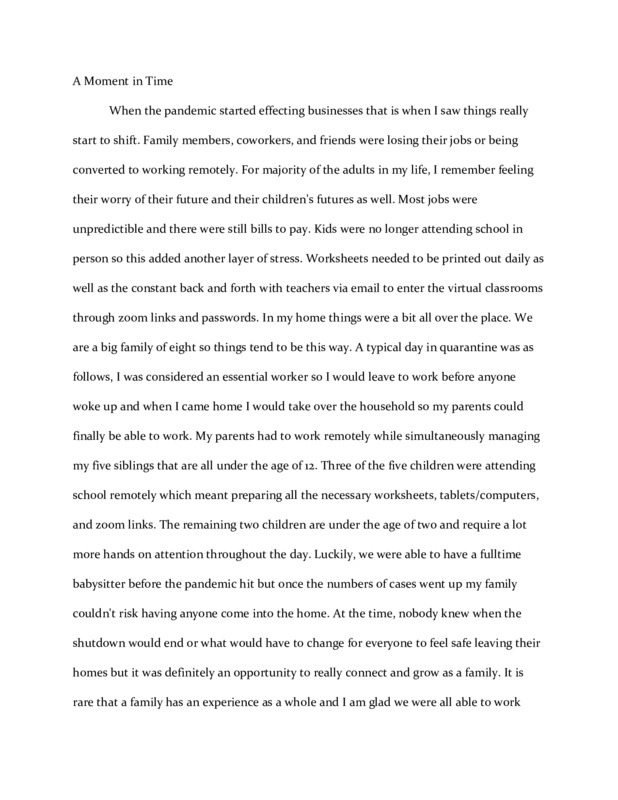 2020-07-07
2020-07-07A Moment in Time
When the pandemic started effecting businesses that is when I saw things really start to shift. Family members, coworkers, and friends were losing their jobs or being converted to working remotely. For majority of the adults in my life, I remember feeling their worry of their future and their children's futures as well. Most jobs were unpredictible and there were still bills to pay. Kids were no longer attending school in person so this added another layer of stress. Worksheets needed to be printed out daily as well as the constant back and forth with teachers via email to enter the virtual classrooms through zoom links and passwords. In my home things were a bit all over the place. We are a big family of eight so things tend to be this way. A typical day in quarantine was as follows, I was considered an essential worker so I would leave to work before anyone woke up and when I came home I would take over the household so my parents could finally be able to work. My parents had to work remotely while simultaneously managing my five siblings that are all under the age of 12. Three of the five children were attending school remotely which meant preparing all the necessary worksheets, tablets/computers, and zoom links. The remaining two children are under the age of two and require a lot more hands on attention throughout the day. Luckily, we were able to have a fulltime babysitter before the pandemic hit but once the numbers of cases went up my family couldn't risk having anyone come into the home. At the time, nobody knew when the shutdown would end or what would have to change for everyone to feel safe leaving their homes but it was definitely an opportunity to really connect and grow as a family. It is rare that a family has an experience as a whole and I am glad we were all able to work together and make the most of this time. Regardless of age, this pandemic has effected us all incredibly and I will definitely look back at this strange time and appreciate the quality time I was able to have with my family. -
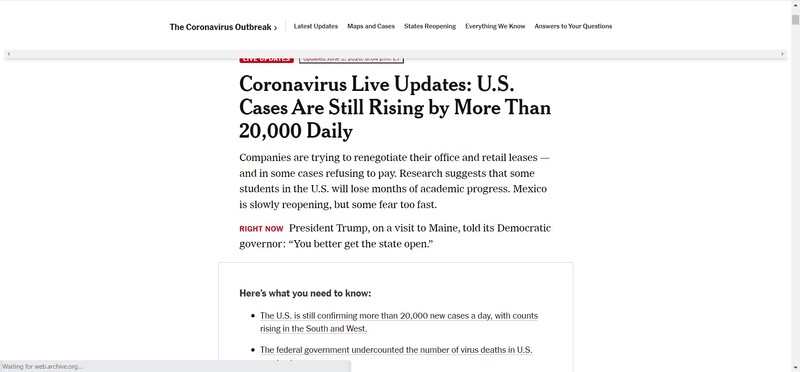 2020-06-05
2020-06-05news about covid 19
these are news about covid 19
